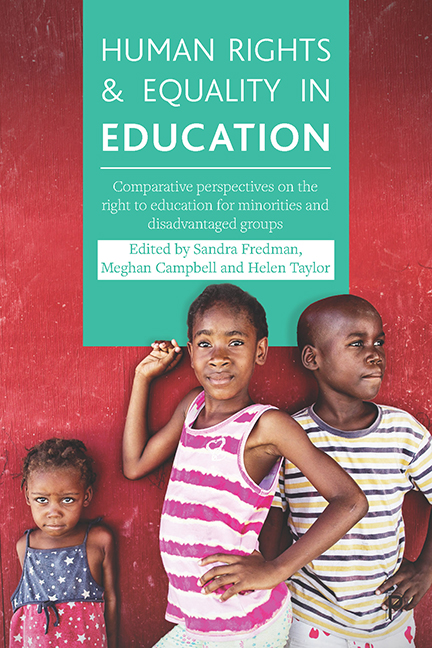 Human Rights and Equality in Education
Human Rights and Equality in Education Book contents
- Frontmatter
- Contents
- Notes on contributors
- Foreword
- Human rights and equality in education: Introduction
- Part I The role of public and private actors in education
- Part II Balancing the right to freedom of religion and culture and the right to education
- Part III Gender equality in education: moving beyond access to primary education
- Part IV Litigating for quality and equality in education
- Index
nine - From the classroom to the courtroom: litigating education rights in South Africa
Published online by Cambridge University Press: 19 April 2022
- Frontmatter
- Contents
- Notes on contributors
- Foreword
- Human rights and equality in education: Introduction
- Part I The role of public and private actors in education
- Part II Balancing the right to freedom of religion and culture and the right to education
- Part III Gender equality in education: moving beyond access to primary education
- Part IV Litigating for quality and equality in education
- Index
Summary
Introduction
In his swansong judgment for the South African Constitutional Court, the erstwhile Deputy Chief Justice Dikgang Moseneke articulated the link between systems of oppression and access to education:
All forms of human oppression and exclusion are premised, in varying degrees, on a denial of access to education and training. The uneven power relations that marked slavery, colonialism, the industrial age and the information economy are girded, in great part, by inadequate access to quality teaching and learning.
Education is thus important for human dignity, equality, livelihood and democracy. Indeed, the transformative and aspirational nature of the Constitution gives a unique role to courts in South Africa to be crucial contributors on matters of public policy, traditionally within the exclusive terrain of the executive branch of government. Since its establishment in 1993, the Constitutional Court has made bold rulings to uphold fundamental rights; abolishing the death penalty, recognising same-sex marriage and compelling the state to permit and facilitate the use of the antiretroviral drug, nevirapine in order to reduce the risk of mother-to-child transmission of HIV. More recently, the Constitutional Court has also extended a commercial contract between the state and a private entity to which government had outsourced the function of paying social assistance, in order to ensure the continued payment of grants to the most vulnerable people in South Africa's deeply unequal society. Most of these progressive gains have been achieved through proactive, strategically minded litigants seeking to give effect to recognised rights in the Constitution and overturn discriminatory laws and practices.
The Constitution confers substantial power upon courts to enforce justiciable socioeconomic rights, including the rights to housing, health care, food and social security, which are to be guaranteed to all people and which require the state to take positive measures to realise the right for those who bear the brunt of structural poverty and inequality. The right to education, guaranteed in section 29 of the Constitution, is in several respects an even more robust right than the other socioeconomic rights in the Constitution.
Section 29 of the Constitution confers an unqualified right on every person to a ‘basic education, including adult basic education’. Similarly, every individual has the right to ‘further education’. However, the state only has to take reasonable measures to ‘progressively realise’ the right to further education.
- Type
- Chapter
- Information
- Human Rights and Equality in EducationComparative Perspectives on the Right to Education for Minorities and Disadvantaged Groups, pp. 143 - 168Publisher: Bristol University PressPrint publication year: 2018


